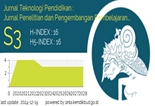Development Of A Problem Based Learning Module To Improve Scientific Literacy Capability And HOTS On The Material Buffer Solution
Abstract
Keywords
Full Text:
PDFReferences
Anggraeni, D., & Erviana, V. Y. (2019). Implementasi Hots Dalam Model Pembelajaran Problem Based Learning (Pbl) Tema 2 Subtema 2 Kelas V Sd Muhammadiyah Bantul Kota Yogyakarta. Fundadikdas, Vol. 1(No. 1), 3.
Fatmianeri, Y., Hidayanto, E., & Susanto, H. (2021). Pengembangan Modul Elektronik Berbasis Differentiated Instruction untuk Pembelajaran Blended Learning. Jurnal Ilmiah Pendidikan Matematika, 1 (1) : 50-62.
Hakim, L., Bentri, A., Hidayati, A., & Amilia, W. (2023). Development of Interactive Multimedia Using Problem Based Learning Model in Class VIII Integrated Science Subjects Junior High School. Jurnal Teknologi Pendidikan : Jurnal Penelitian dan Pengembangan Pembelajaran, 8(4), 787-795.
Kimianti,F & Prasetyo, Z. K. (2019). Pengembangan E-Modul IPA Berbasis Problem Based Learning Untuk Meningkatkan Literasi Sains Siswa. Jurnal Teknologi Pendidikan, 7 (2) : 91-103.
Mudhakiyah, Zaqiatul, Nanik Wijayati, Sri Haryani, and Sri Nurhayati. (2022). Pengembangan Instrumen Penilaian Aspek Psikomotorik Peserta Didik Pada Praktikum Pembelajaran Kimia Materi Laju Reaksi. Chemistry in Education 11(2):166–72.
Nainggolan, F., & Nainggolan, B. (2024). The Influence of Implementing Problem-Based EModules on Students' Motivation And Learning Outcomes on Colloid Systems Chemistry Materials in Senior High School. Jurnal Teknologi Pendidikan : Jurnal Penelitian dan Pengembangan Pembelajaran, 9(2), 308- 313.
Nurhayati, Y., Ifrani, I., & Said, M. Y. (2021). Metodologi Normatif Dan Empiris Dalam Perspektif Ilmu Hukum. Jurnal Penegakan Hukum Indonesia, 2(1), 1-20.
Permatasari, P., & Fitriza, Z. (2019). Analisis Literasi Sains Siswa Madrasah Aliyah pada Aspek Konten, Konteks, dan Kompetensi Materi Larutan Penyangga. EduKimia, 1(1), 53–59. https://doi.org/10.24036/ekj.v1i1.104087
Purwanti, A. D., Mulyani, B., & Ulfa, M. (2022). Analisis Muatan Literasi Sains dan Higher Order Thinking Skills dalam Buku Ajar Kimia SMA Kelas X pada Materi Reaksi Redoks. Jurnal Pendidikan Kimia , 11(2), 117–120.
Rohmah, M., & Ni’mah, F. (2021). Identifikasi Dan Pengaruh Kemampuan Awal Terhadap High Order Thinking Skills (Hots) Pada Materi Larutan Penyangga. Quantum: Jurnal Inovasi Pendidikan Sains, 12(2), 249. https://doi.org/10.20527/quantum.v12i2.10362
Safriani, Y & Lazulva. (2021). Desain dan Uji Coba Modul Pembelajaran Kimia Berbasis Chemo Entrepreneurship (CEP) Pada Materi Koloid. Jurnal Pembelajaran MIPA, 1 (2) : 81-88.
Salsabila, S., Sripatmi, S., Salsabila, N., & Azmi, S. (2023). The Effect of Using The ProblemBased Learning Model on Learning Outcomes of Class VIII Junior High School Students. Jurnal Teknologi Pendidikan : Jurnal Penelitian dan Pengembangan Pembelajaran, 8(4), 935-942.
Sugiyono. (2013). Metode Penelitian Pendidikan Kuantitatif, Kualitatif, dan R&D. Bandung: Alfabeta.
Suparya, I. K., I Wayan Suastra, & Putu Arnyana, I. B. (2022). Rendahnya Literasi Sains: Faktor Penyebab Dan Alternatif Solusinya. Jurnal Ilmiah Pendidikan Citra Bakti, 9(1), 153–166. https://doi.org/10.38048/jipcb.v9i1.580
Yusuf, A. A. T. U., Husain, H., & Side, S. (2023). Pengaruh Model Problem Based Learning Terhadap Kemampuan Literasi Sains Peserta Didik Kelas XI MIA Sma Angkasa Maros. Secondary: Jurnal Inovasi Pendidikan Menengah, 3(1), 77–89. https://doi.org/10.51878/secondary.v3i1.1971
Zakaria, R., Mustari, M., Sawaludin, S., & Alqadri, B. (2024). Development of PPKn Learning Based on an Android Application through Google Sites at SMA Negeri 1 Lembar. Jurnal Teknologi Pendidikan : Jurnal Penelitian dan Pengembangan Pembelajaran, 9(4), 588-598.
DOI: https://doi.org/10.33394/jtp.v10i1.13610
Refbacks
- There are currently no refbacks.
Copyright (c) 2025 Debora Sevenia Siringoringo, Gulmah Sugiharti

This work is licensed under a Creative Commons Attribution-ShareAlike 4.0 International License.
This Journal has been Indexed by:
Jurnal Teknologi Pendidikan
ISSN: 2656-1417 (Online)
ISSN: 2503-0620 (Print)
Published by Program Studi Teknologi Pendidikan, FIPP
Universitas Pendidikan Mandalika
Email: [email protected]

This work is licensed under a Creative Commons Attribution-ShareAlike 4.0 International License.















.png)






